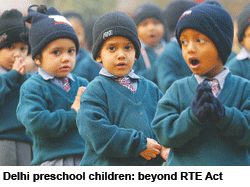By allowing unaided private schools to frame their own criteria for admission into preschools and nurseries, the Delhi high court has restored some order into the national capital’s chaotic nursery admissions scene. But at the same time the court has provided fresh ammunition to activists demanding inclusion of preschool education within the ambit of the Right to Free and Compulsory Education (aka RTE) Act, 2009.
 On February 19, a high court bench comprising Chief Justice D. Murugesan and Justice V.K. Jain ruled that the RTE Act and subsequent notifications issued by the Union government and department of education of the Delhi government are not applicable to admissions in unaided private preschools or nurseries. According to the lear-ned judges, except for reserving 25 percent capacity in class I and subsequently all the way upto class VIII for children from poor households in school neigh-bourhoods, the RTE Act does not mandate any other reservation of capacity for weaker sections and disadvantaged groups.
On February 19, a high court bench comprising Chief Justice D. Murugesan and Justice V.K. Jain ruled that the RTE Act and subsequent notifications issued by the Union government and department of education of the Delhi government are not applicable to admissions in unaided private preschools or nurseries. According to the lear-ned judges, except for reserving 25 percent capacity in class I and subsequently all the way upto class VIII for children from poor households in school neigh-bourhoods, the RTE Act does not mandate any other reservation of capacity for weaker sections and disadvantaged groups.
However, in its 33-page judge-ment, the bench recommended amendment of the RTE Act to include preschool education within its ambit. “Though we have held that Right to Education Act is not applicable to nursery schools, in our opinion there cannot be any different yardstick to be adopted for education to children up to the age of 14 years, irrespective of the fact that the Act applies only to elementary education. It is the right time for the government to consider the applicability of RTE to nursery classes as well,” the bench observed.
The judgement is the outcome of a PIL (public interest litigation) writ filed in 2010 by the Delhi-based NGO Social Jurist and the Delhi Commission for Protection of Child Rights, questioning the constitutional validity of a Union human resource development (HRD) ministry guideline permitting presc-hools/nurseries to frame their own criteria and rules for admission of children in the age group 0-6.
The February 19 Delhi high court verdict upholding the HRD ministry’s guideline, has disappointed the RTE Forum, a network of civil society groups, which intends to file an appeal in the apex court praying for reconsideration of the judgement to protect the right to education of children under six years of age. “In the RTE Act s.11 advises state governments to make necessary arran-gements for preschooling children in the age group 3-6 years. Therefore pre-schools/nurseries should also be brought within the purview of the Act,” says Ambarish Rai, convenor of the RTE Forum.
Dr. Vinod Raina, an education activist and member of the Central Advisory Board of Education (CABE) who was associated with the drafting of the RTE Act, supports Rai’s argument. In a letter dated February 17 addressed to the Delhi high court bench — two days before it delivered its judgement — Raina wrote: “From media reports I learn that the Central government/HRD ministry has submitted an affidavit to the court that the RTE Act does not apply to children in the 0-6 age group. The implication would be that their admission need not follow the random, non-screening procedure laid down in the Act for children in the 6-14 age group in s.13 (2)(b). This would result in an anomalous situation whereby the admission procedures of the 0-6 age group would be different from those of 6-14 years age group.”
Meanwhile, the private schools lobby is enthused by the Delhi high court’s ruling that preschools don’t fall within the purview of the Act. “The Supreme Court has conferred full autonomy on private schools subject to two provisos: one, the admissions process should be objective and transparent and two, there should be no commercialisation, especially levy of capitation fees. Autonomy is very important not only for unaided private schools, but also for aided and government schools. Some people wanted to curb the autonomy of preschools, which the learned judges have struck down. True, the court has made a remark about including pre-schools within the ambit of the RTE Act without going into its feasibility. In such an eventuality, the amendment will go through the process of parliamentary discussion and I am sure, we’ll also get an opportunity to present our case,” says S.K. Bhattacharya, former chairman of the National Progressive Schools Conference (NPSC), an organisation of 110-plus unaided private schools.
If not stakeholders in school education, lawyers have certainly reaped a rich harvest from the RTE Act.
Autar Nehru (Delhi)